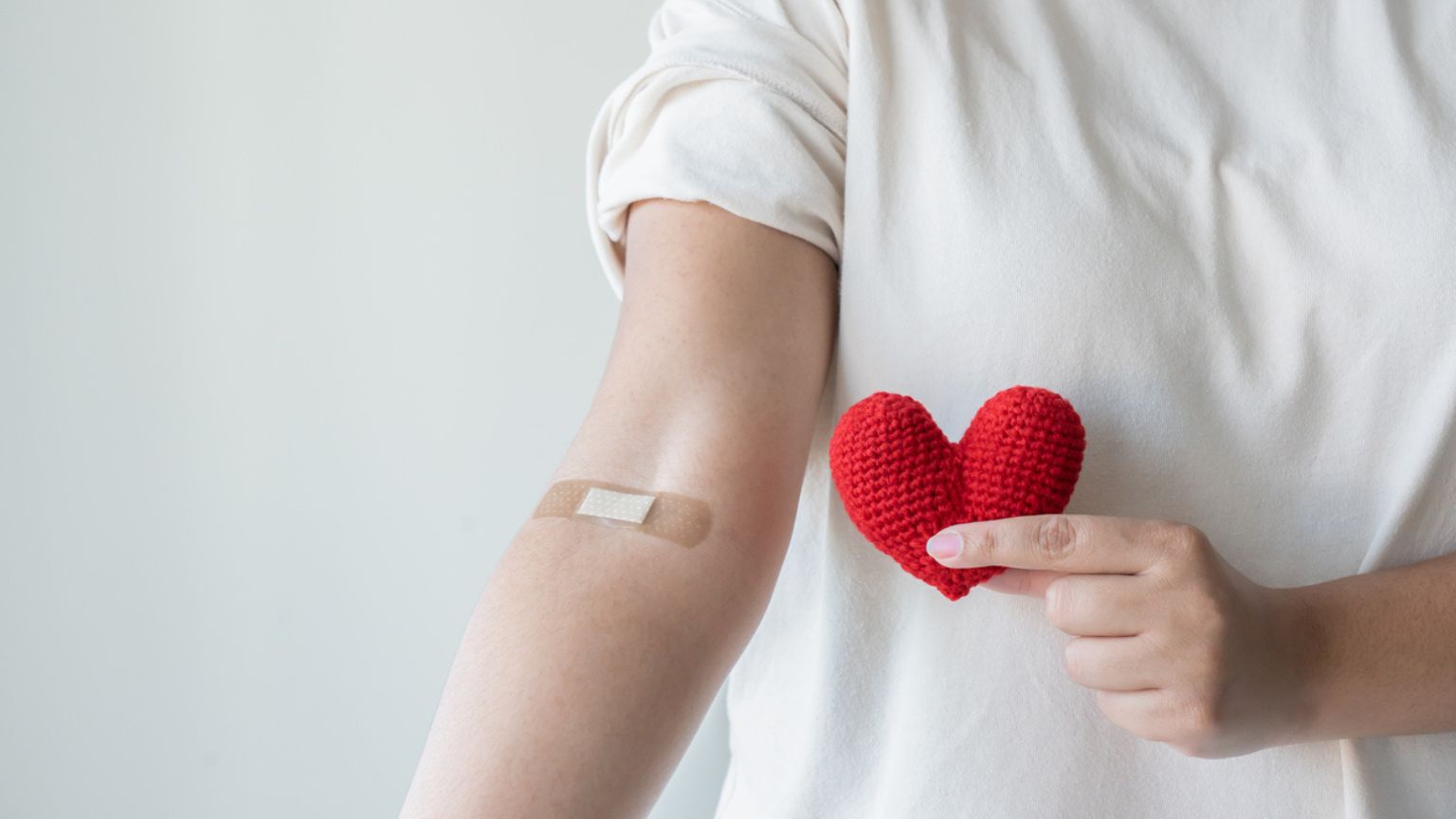Whether you’re concerned about your blood pressure, cholesterol or blood sugar levels – experts reveal 3 reasons why you might have a blood test
Most of us don’t give our blood much thought, yet it’s important to know what you can do to keep it healthy. Blood makes up about seven per cent of your body weight, that’s around four to five litres on average.
Blood is made up of 55 per cent plasma (a watery, yellowish fluid), red blood cells (which carry oxygen to the tissues and organs), white blood cells (to fight infection) and platelets (involved in the clotting process).
‘It flows through the veins, arteries and capillaries and has many different functions,’ says Dr Sarah Brewer, Consultant Medical Nutritionist.
‘It transports oxygen, nutrients and hormones around the body, carries carbon dioxide and other wastes away from the cells, regulates body temperature and forms blood clots to prevent excess blood loss.
getting regular blood testes, will help all your body systems to function more effectively
‘To stay healthy, blood needs to be well nourished and flowing smoothly and your blood vessels need to be elastic. and clear of disease. There are all sorts of lifestyle factors that can affect the health of your blood.
‘These include poor eating habits, nutritional deficiencies, lack of exercise, stress, drinking too much alcohol, certain medications and exposure to chemicals and environmental toxins.
‘Over time, unhealthy blood can lead to health issues such as anaemia, high blood pressure, headaches, fatigue, breathlessness, chronic infections, allergies, skin outbreaks, varicose veins, cardiovascular disease, poor circulation, liver and kidney problems.
‘By taking steps to optimise your blood health, such as getting regular blood testes, will help all your body systems to function more effectively and reduce your risk of developing serious health issues’.
READ MORE: 5 ways to boost blood circulation
Why are blood tests important?
‘Blood tests can be used for a variety of purposes, including as an aid to diagnosis of an underlying condition or as an overall check on your physical wellbeing,” says Dr Karen Breen, Consultant Haematologist at (London Bridge Hospital – part of HCA UK).
The provide useful information on hormonal, heart, kidney, liver, thyroid, digestive and nutritional healthy can. A blood test can also be used as a test for chemicals and proteins which can paint a clear picture of liver and kidney function, while a full blood count (FBC) will look for things like iron deficiency anaemia or vitamin B12 deficiency anaemia as well as bleeding or clotting disorders.
‘Blood tests can be used for monitoring cholesterol and blood glucose levels which can aid in monitoring your risk of heart and circulatory diseases, as well as diabetes management.
The provide useful information on hormonal, heart, kidney, liver, thyroid, digestive and nutritional healthy can
‘There is not one specific test to determine if your blood is healthy and usually depends on analysing several markers in the blood that determine whether your blood is healthy’.
Blood Test Reason #1 Nutrient Deficiencies
‘Nutrients such as iron, folate and vitamin B12 are essential for the healthy production of blood,’ says Rob Hobson, Consultant Nutritionist at supplement brand Healthspan.
‘But, research shows that many women are lacking in these essential blood nutrients’.
The National Dietary and Nutrition survey shows that 27 per cent of women do not get enough iron from their diet putting them at risk of anaemia.
Iron is required for the production of blood. Around 70 per cent of our body’s iron is found in red blood cells, called haemoglobin, and muscle cells, called myoglobin.
Haemoglobin is required for the transfer of oxygen from the lungs to the tissues in your blood. Myoglobin accepts, stores, transports, and releases oxygen in muscle cells. A lack of iron in blood can cause anaemia.
if you have really heavy periods, it’s a good idea to eat more iron rich foods
Low levels can lead to chronic fatigue as oxygen delivery around the body is depleted. If you suspect you might be low in iron, ask your GP to arrange a blood test.
‘Heavy periods can also cause iron deficiency. So, if you have really heavy periods, it’s a good idea to eat more iron rich foods (eg: leafy greens, liver, red meat, beans) and also to take a supplement,’ says Rob.
‘How you take the supplement is important too. Orange juice, for example, enhances iron absorption, but drinking too much tea can deplete iron’.
Vitamin B12 and Folate levels are nutrients that support the formation of red blood cells, and can help to help to create and regulate the functions of DNA. A deficiency of folic acid and B12 can also increase the risk of anaemia.
Try: Healthspan IronCare, £6.95 – also available on Amazon.
READ MORE: Biohacking – could strength training boost your brain power?
Blood Test Reason #2 Cholesterol Levels
Your cholesterol numbers show how much cholesterol is circulating in your blood.
Your HDL (‘good’ cholesterol) is the one number you want to be high (ideally above 60).
Your LDL (‘bad’ cholesterol) should be below 100.
Blood Test Reason #3 Blood Pressure
High blood pressure (hypertension) is referred to as the silent killer as it often has no symptoms. Latest figures from Blood Pressure UK (bloodpressureuk.org) show that in one in three adults has high blood pressure and six million people don’t know they have it.
Low blood pressure (hypotension) is less common and usually not as detrimental as high blood pressure, although this may also indicate a health issue that needs to be looked at.
one in three adults has high blood pressure and six million people don’t know they have it
‘Maintaining a healthy blood pressure is critical because the higher your blood pressure, the more likely you are to experience health problems,’ says Dr Karen Breen.
‘All of your body’s vital organs, including your brain and heart, receive nutrients and oxygen through your blood flow. When you have an unhealthy blood pressure, your heart and arteries have to work harder than usual.
‘This additional stress can damage these vital parts of the circulatory system over time and can increase your risk of strokes, kidney failure, heart attacks, and blindness’.
READ MORE: PMS symptoms? Experts reveal 7 supplements you NEED to know about
What Do Your Readings Mean?
‘Blood pressure is the force that pushes blood through your circulatory system,’ says Dr Brewer.
‘This pressure is generated with each heartbeat as blood is pumped from the heart into the blood vessels. A blood pressure reading looks at two numbers – systolic blood pressure (top number), the pressure when your heart pushes blood out, and diastolic blood pressure (bottom number), the pressure when your heart rests between beats’.
140/90mmHg or over – high blood pressure. A reading of 140/90 or over is classified as high blood pressure. This is where your risk of serious health problems goes up.
120/80mmHg – 140/90mmHg – pre-high blood pressure. Also, called high-normal blood pressure, this is higher than it should be and means you could go on to develop high blood pressure.
90/60mmHg – 120/80mmHg – ideal blood pressure. This is normal, healthy blood pressure.
90/60mmHg or lower – low blood pressure. Low blood pressure isn’t usually a problem, although if you have symptoms this may be a sign of another health problem.
Checking your blood pressure
You’re at increased risk of high blood pressure if:
- you are overweight,
- you smoke,
- drink too much alcohol,
- don’t get enough exercise,
- are over 65,
- have a family history of high blood pressure,
- don’t get enough sleep,
- eat too much salt (sodium),
- don’t eat enough fresh fruit and vegetables.
‘If you’re over 40 and healthy, you should have your blood pressure checked at least very five years. You can have a blood pressure test at, your GP surgery or pharmacies.
READ MORE: Experts reveal 13 health, fitness and beauty trends for 2023
Knowing your blood type
‘Knowing your blood type should be as familiar as your birth date,’ says Sonia Gilmartin Chief Medical Scientist, Haematology Laboratory In Ireland.
‘Some disease states are associated to various blood types. You would need to have a sample taken to get your blood type, this can be done at your local GP surgery.
‘It’s also important for females to know their blood type in miscarriage or termination as they might require Anti D Immunoglobulin’.
Give Blood
Giving blood is one of the most generous things you can do and it doesn’t cost a penny. Check out if you are eligible and where you can donate in your area by visiting their website – https://www.blood.co.uk
Certain blood types are needed more than others for example O Rhesus Negative blood group as this can be given to any blood group.
There are restrictions about who can and can’t give blood for example if you are under a certain weight or have previously had certain medical conditions, some medications you are on could mean you are not suitable so do check out their website.
Like this article? Sign up to our newsletter to get more articles like this delivered straight to your inbox.

























































